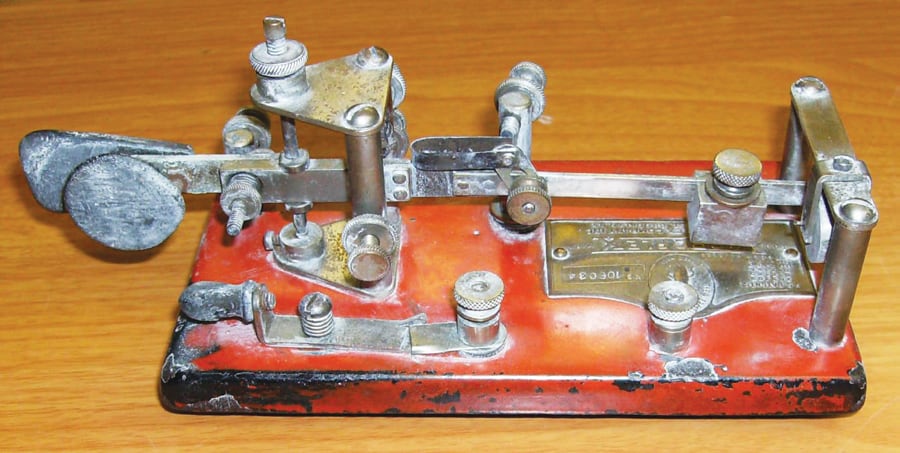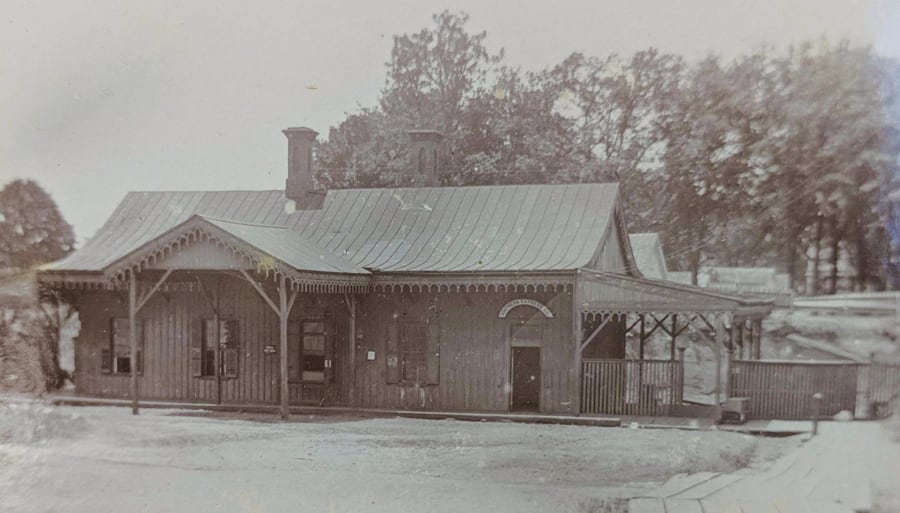When the Charleston to Hamburg Railroad crisscrossed through what is now Aiken County in the early 1830s, the need for train depot stations along the new railroad line soon followed. And where a depot developed, so did a community. In an era prior to the invention of automobiles, the trains that stopped at the depots brought friends, family, groceries, clothing, and other daily essentials to a growing community. Thus, train station depots became an integral part of life.
Depots provided travel, supplies, and communication.
For a bit of a time travel, we have included a late 1800s photograph of the Aiken passenger depot station, which was located near the intersection of Fairfield Street and Park Avenue. The Aiken passenger depot would have welcomed Winter Colony patrons and local travelers. Down the road was the freight depot, which received everything from coal to manure. An article from the Aiken Journal and Review on May 20, 1885, argued against the removal of the passenger depot to combine it with the city’s freight depot. “Not only will it inconvenience the public, but the people of Aiken and our visitors will be nauseated to death in the Spring with the disgusting smell of the fertilizers stored at the freight depot.” A very good point, to be sure.
Also included in this article is a photograph of a telegraph key from the now displaced town of Ellenton. Before the days of cell phones or the internet, if you wanted to send a quick note to someone, you sent it via telegraph. Depots often housed telegraph offices where town residents could receive and send messages via Morse Code.

Photograph of a Vibroplex telegraph key used at the Ellenton Depot, ca. 1950. Donated by Herbert Harden, ACHM Collection.
Where there is a depot, there is a way home … eventually.
In early June of 1874, a group of six young gentlemen from the city of Aiken traveled via train to the depot in Bath to enjoy a day of fishing in the Bath Mill Pond. However, soon after disembarking there began a comedy of errors that wouldn’t see them home until the wee hours of the following morning.
After quite a while of standing in the muddy water with not a single nibble on their hooks, a member of their group suggested they all go bathe in the cool, fresh waters of the nearby creek. After playing and splashing about, it seemed to everyone that they should head back to Aiken. One of the fishermen on the banks told them if that was their wish, they didn’t have a moment to spare! All the swimmers made a mad rush for the small island that held their clothes. “On gaining it each of the party tried to dress himself faster than the rest. Some put on their pants wrong-side-out; others put on their boots before their socks, and others dressed themselves as though they had been going to Miss Nellie Grant’s marriage.” They all took off simultaneously, running for the train that they could hear rolling in to the depot. Fifty yards from the island someone in the party had a terrible and untimely realization: he had left his pants behind… “The train rolled off leaving us behind in a state of mind and an emptiness of stomach characteristic of newspaper folks; and we used some language that would not have been very becoming to an old-fashioned Methodist minister.”
By this time, night was rapidly falling, and the group knew they needed to find accommodations or be forced to walk all the way back to Aiken. Upon reaching the dam, they encountered a man who gave them a string of 16 fish in exchange for thirty five cents. Just a few yards farther, they obtained another string of fish for forty cents, and a bit further down from that discovered a man who was willing to cook the fish for them while they went for a walk to Mr. Kizer’s store, where they “purchased a jar of pickles, cigars, and something else, which the reader can guess without much difficulty.” When they returned from the store they found 25 cooked fish and two tremendous corn hoecakes awaiting them.
After they paid their bill of $1.85, they set out for Langley’s depot, just three miles away. Searching in vain for a boarding house, they resigned themselves to spending the remainder of the evening at the depot. “Each of the party picked himself out a soft board, and putting his handkerchief under his head, soon fell into a calm and uninterrupted slumber.” After the bell tolled the hour of 3:00 am, two of the party decided to walk to Aiken, and by daybreak a third member followed. The trio that was left explored the town and the “magnificent building of the Langley Cotton Manufactory” until they heard the train pulling into the depot. The group boarded the train and were soon in Graniteville, where they were reunited with one of their friends. He had given up the notion of walking to Aiken by the time he reached the depot, and was more than happy to board the train with them there.
“‘Home again!’ There never was a more thankful party than ‘we three’ when the Aiken depot came into view … When we want fresh fish we will purchase them from some of our fish and game dealers …”
Next time you are driving around the county, pay attention to any small buildings along the train track. You might just be observing a train depot where so many lives (and fertilizer) once traveled. Stay curious y’all!

Photograph of Aiken’s Passenger Depot, ca. 1895. Hahn Photography Album, ACHM Collection.
























